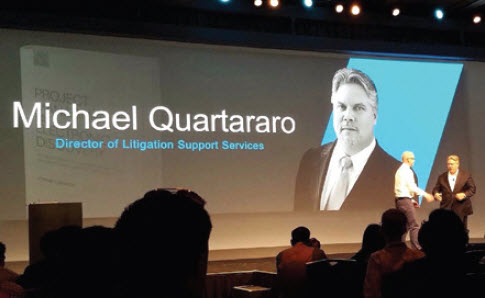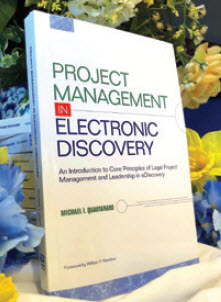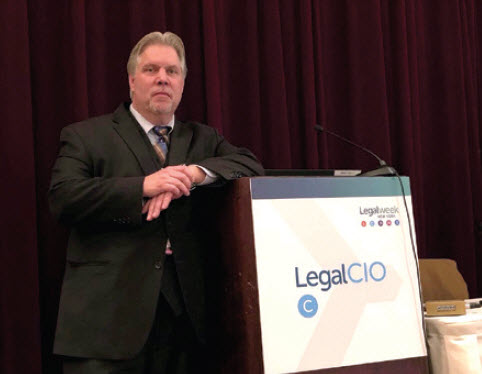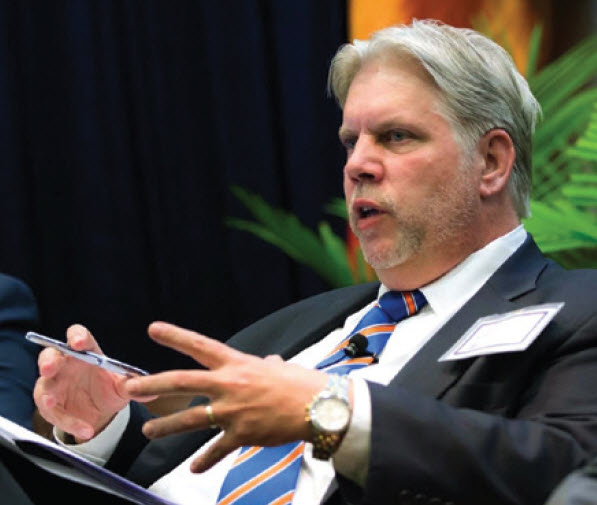A Conversation with ACEDS’ Michael Quartararo
[glossary_exclude]Mike Quartararo has been solving problems in e-discovery and IG for 20 years. Mike is an author, teacher, and thought-leader, and holds certifications in e-discovery (CEDS) and project management (PMP). He has built his career upon strategic and innovative thinking, leadership, and operational skills honed at the best legal organizations in the world.
He began his career as a paralegal at big law firms in New York. In 1999, he joined Skadden Arps Slate Meagher & Flom LLP where he led e-discovery projects related to complex class action securities and international litigations. Later, as a database specialist, project manager and trainer, he focused on managing data collection and processing projects, large-scale document reviews and trial presentation. During his ten years at Skadden Mike began to study and apply project management principles to litigation and e-discovery projects.
In 2008, Mike joined Stroock & Stroock & Lavan LLP to build and lead their litigation support operation. As firm-wide director of litigation support he led a staff providing consultative e-discovery, litigation support and technology services. Mike introduced project management principles and he developed and implemented policies and procedures relating to information governance, e-discovery and trial services. He was also responsible for the design and delivery of firmwide e-discovery training programs. Mike co-founded the firm’s eDiscovery and Information Governance Group and regularly provided advisory services to attorneys and the firm’s Fortune 500 clients.
In 2012, Mike became a part-time graduate professor and advisor at Bryan University in Tempe, AZ. He co-designed and taught classes in e-discovery and project management, developed a project management simulation course, and also secured educational licenses for leading e-discovery applications and developed a laboratory for students to gain practical, hands-on experience.
Mike left Stroock in 2018 to launch his own successful consulting practice. eDPM Advisory Services provides legal operations, e-discovery and project management advisory services to corporate legal departments and law firms and Mike frequently speaks and writes on topics relating to his consulting practice.
In late 2019, Mike was named president of the Association of Certified E-Discovery Specialists (ACEDS), a global professional membership association providing live and online training and certification in e-discovery and professional development courses to corporate legal departments, law firms and the broader legal community.
Mike is a graduate of the State University of New York, with a Bachelor’s in psychology and music. He studied law at the University of London, Holborn College.
IGW: Where did you grow up, go to school?
MQ: I grew up in New York and went to college in upstate New York at SUNY New Paltz. I considered law school in the US for a while, but opted to complete a year of law school at the University of London, Holborn College, where you “read” the law. We studied the Magna Carta, the British legal system and its common law foundations. I literally had to recite British court decisions to pass those classes. It was enlightening and it set me on a legal course in my career.
What are some of your fondest memories from growing up?
Growing up we did a lot of outings and other family activities. I really used to like fishing and I recall holding the record for some period of time for the biggest bluefish caught out of Shinnecock Inlet on Long Island. Truth is my dad helped me reel it in, but he gave me all the credit.
What sparked your interest in the Law?
I’ve always been fascinated by government and the law. There’s something about the organizational structure and the orderliness that appeals to me. I like rules and procedures and frankly some of the best work I’ve ever done is the policy development and instructional stuff. It’s also what likely led me to project management –the structure and process of it all. But without a law degree, where do you go in the legal industry? I chose early on the paralegal route and later law firm management and administration.

How did you get involved in the eDiscovery space?
The first time I heard the phrase electronic discovery was in the mid to late 1990s. I was leading a team at the time focused on discovery for a major class action litigation. More and more relevant documents were surfacing that the lawyers needed to look at and working in big law at the time gave me the advantage of resources. So, we set about to convert the electronic documents to tiff images and scan the paper documents and lawyers began looking at the documents on a computer screen instead in boxes of paper. OCR enabled them to search. Coding helped them to sort. It was truly revolutionary back then. I went on to work on many more cases like that and eventually began training others and eventually I found myself running an entire department dedicated to providing e-discovery services internally and to clients of the firm.
I’ve seen horror stories about missing, altered or deleted data. This should not be happening today with the technologies that are available.
What is the biggest mistake companies make in preparing for eDiscovery, or carrying out an eDiscovery project?
The biggest mistakes that companies make in e-discovery are underestimating the early stages of the process. I always say that IG is the foundation of e-discovery. And it’s 100% true. If you look at the EDRM it starts with several processes built around IG. If I have learned nothing else over the years there are several things you can do in those early stages–the IG stages—that can save you time and money later. Simply knowing what data, you have, where it is stored and secured, who has access to what data, and how you dispose of data are critical. Quite apart from the business value of information, if when you are faced with litigation, an investigation, or a regulatory inquiry, you are able to efficiently identify the data assets impacted by the dispute or inquiry, well, then you’re going to find the e-discovery process more tolerable and more affordable. But to answer your question more succinctly, the biggest mistake I’ve seen over the years is failing to properly identify information relevant to a dispute and then implementing a proper legal hold or preservation order. Too many times I’ve seen horror stories about missing, altered or deleted data. This should not be happening today with the technologies that are available.

What trends are you seeing with technologies and approaches to eDiscovery?
I’m seeing a lot of movement toward automation and finding efficiency. And this involves a lot of the machine learning or AI tools we are seeing on the market today. If you had told me 20 years ago that I would be able to parse through 5 million documents and pull out conceptually relevant or related content in a few hours, I probably would have said that’s crazy. But today we’re doing this. And we’re using similar tools to analyze thousands of contract clauses, or to perform sentiment analysis on email messages across a massive corporate enterprise. But what’s particularly cool to me, too, is the growth of process-oriented tools that are designed to make managing projects more effective and more efficient. Analytics, metrics, KPIs—all of these are starting the play a role in legal environments as we all converge on the best way to do things. It’s an exciting time to be in e-discovery.
How do you see the intersection or overlap of IG and eDiscovery?
As I say, IG is the foundation of e-discovery. Everything that happens in the e-discovery lifecycle, from preservation, collection, processing, review and production—all those processes flow from the IG processes that precede it. There’s no simpler or more important way to look at it. And so, if you’ve got sound IG processes in place, that can only help improve your e-discovery processes down the line.

You were recently named President of ACEDS. What is your vision for a thriving ACEDS community? What obstacles must you overcome?
Thank you, I appreciate you raising this. Yes, I took over as the president of the Association of Certified E-Discovery Specialists last October. We are the world’s leading e-discovery training and certification organization. We have roughly 2500 active members in 20 countries across the globe, about 1450 of which are Certified E-Discovery Specialists or CEDS. My goal is to grow the organization membership. Currently, we have 24 chapters in most major US cities, the UK, Ireland, Canada, The Netherlands, and South Africa. We’re looking to expand to Australia and South America too. But the membership is the lifeblood of the organization and we’ve been very pleased with the growth.
Some of the obstacles have been finding the time to update our training materials and certification exam and introducing more structure to the many chapters. We have been chipping away at these, but we still have a way to go. One of the things I’ve been passionate about is giving back. And so, we’ve introduced a scholarship/hardship program and later this year we will roll out a reinvigorated mentorship program that is designed to pair senior people with junior people for training, career development advice, and networking opportunities.
Who has been a mentor for you, and what key lessons did they teach you?
I’ve had so many mentors over the years, most of them attorneys I’ve gotten to know and remain friends with to this day. Navigating in the legal industry is rarely done alone. There are at least a dozen people who at various times have guided and shaped my career. I mean, I’m the head of one of the most successful professional organizations in our space—and I would not be here were it not for several people who helped me analyze and navigate complex issues and implement creative solutions; who taught me to persevere in the face of obstacles; and who encouraged me to forge a new path and adopt new technologies. I used these words recently during a speaking engagement and they are true. More than anything, what I’ve learned, though, is a certain degree of emotional intelligence and how to communicate with people. Keeping a cool head and talking with people—adversary or best friend—tactfully and with respect are probably the most useful tools I’ve learned to use.
If you had told me 20 years ago that I would be able to parse through 5 million documents and pull out conceptually relevant or related content in a few hours, I probably would have said that’s crazy.
Tell us about your volunteer work, and why is it is important to you?
I consider myself to be very blessed. I’ve built a career and reputation in an industry that just 20 years ago didn’t really exist. I have had the opportunity to manage great teams and I’ve been exposed to great managers. I’ve been well-compensated, and I hope I remain well-regarded among my peers. Having been rewarded, I feel it only appropriate to give back. So, I volunteer as the executive director of the Life Preservers Project, a small, grassroots nonprofit organization in New York dedicated to providing support and services to victims of human trafficking and to raising awareness in at-risk communities.
What is your favorite sports team, and why?
I grew up in Queens and for better or worst most people there are fans of the New York Mets baseball club. And I’ve taken a lot of flak about this over the years from my friends who are Yankees fans. I mean who has more championships than the Yankees, right? But I love the grit and underdog status of my Mets—and they try. They really do. Sometimes I feel like they can’t get out of their own way, but they’ve always been my team. And just like in other areas of life, I place a high premium on loyalty. But the truth is that I’m a fan of baseball in general and that’s because I played a little when I was younger, and I can appreciate the complexities of the game.[/glossary_exclude]
recent posts
You may already have a formal Data Governance program in [...]

